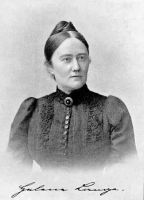Helena Lange
Quotation: As long as women are not formed for their own sake as a human to a human… and should be educated only to serve their husbands, the German women’ s education will not change.
Why do I think the woman is important?
By her activities in public life in Germany Helene influenced the education reform for girls with widespread impact.
Childhood and youth
At the age of seven she lost her mother and at sixteen her father. So she was orphan at a young age and had to rely on herself. In the family of a South German pastor, where she spent one year, she grew aware that women compared with men were much less educated and therefore had to keep quiet.
Education and Profession
In Helene awoke opposition against this injustice. She decided to become a teacher. First this she took a job teaching German language in a French boarding school. Self-taught, she learned philosophy, history, literature, history of religion and old languages. When she reached adulthood, she took in Berlin her teacher examinations. When she was 26 she obtained the position as a teacher at the Higher Girls’ School in Lichtenberg and two years later at the Higher Girls’ School Crain in Berlin. During her 15 years work at this school she established teacher’s seminars for women and tried to achieve a fundamental change in the education of young girls.
Political activities
In 1888 Helene, together with some other women, requested a scientific education for female teachers in a petition to the Prussian Education Ministry, which had been rejected. The government had no interest in better education of its daughters. But an accompanying article, the so called “Yellow Brochure”, written by Helene, became the decisive impetus for the education reform of girls and was supported by the public.
One year later she established “Real courses” for women, which provided an educational base for a practical profession. In addition, she achieved that graduates of the Real courses were admitted to study at a Swiss university. From the first female high school graduates in 1896, there came a signal effect that extended far beyond Berlin. Helene Lange was known by now as a fighter for better education for women and for women’s rights. She founded the General Association of German female Teachers; she was elected to the executive board of the General German Association of Women and was elected President of the Umbrella Organization for all German Women’s Associations, a position which she held until 1930. She founded the important women’s magazine “Die Frau”, a journal of the bourgeois women’s movement, edited until 1944.
Political cohabitation
Around the turn of the century, an eye disease disabled Helen’s writing and teaching. The young like-minded Gertrud Bäumer came to her aid. They entered together the so called “political cohabitation” that lasted until the end of Helene’s life. Together they have been appointed by the Prussian Ministry of Culture to the Commission for the Reform of higher schools of girls. They held inspiring speeches about education of girls and women and they wrote a lot of publications and works like the famous “Manual of Women’s Movement” in five volumes. In 1908 they joined the German Democratic Party DDP, to which also Theodor Heuss, Elly Heuss-Knapp, Mathilde Planck and others belonged. In 1919 Helene was elected to the Hamburger Parliament. She also was Honorary Citizen of her Hometown Oldenburg and finally received a honorary doctorate of the University of Tübingen. Her last years until her death on the 30.5.1930 she lived retired in Berlin.
Literature
- Dorothea: Helene Lange – Ein Leben für das volle Bürgerrecht der Frau. Oldenburg 1999. Frandsen
- Kuhne, Stefanie: Helene Lange, die Theorie der Geschlechterdifferenz im Denken einer gemäßigten bürgerlichen Frauenrechtlerin. Berlin 2007.
- Eva Matthes/ Caroline Hopf: Helene Lange und Gertrud Bäumer. Ihr Beitrag zum Erziehungs- und Bildungsdiskurs vom Wilhelminischen Kaiserreich bis in die NS-Zeit. Bad Heilbrunn 2003.
- Angelika Schaser: Helene Lange und Gertrud Bäumer : eine politische Lebensgemeinschaft. L'homme: Schriften:6, Köln 2000.
- Gertrud Bäumer: Helene Lange zum 100. Geburtstag. Berlin 1948.
Links
- http://www.bpb.de/gesellschaft/gender/frauenbewegung/35312/helene-lange?p=all 17.2.14
- http://www.naanoo.com/faq/helene-lange-biografie-der-kopf-der-deutschen-frauenbewegung 17.2.14
- http://www.fembio.org/biographie.php/frau/biographie/helene-lange/
Image
- Photographie Atelier Elvira, Hofphotographische Anstalt München vor 1899, Autor: Telrúnya 22:56, 8 April 2008 (UTC), Quelle: http://www.dhm.de/lemo/html/biografien/LangeHelene/ / http://commons.wikimedia.org/wiki/File:Helene_Lange_vor_1899.jpg, Licensing: PD.




